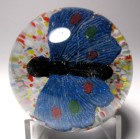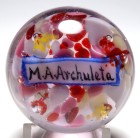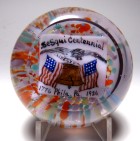![]()
Degenhart Paperweights for Sale
![]()
Degenhart Paperweights for Sale
Most of the paperweights on this page are the work of the John and Charles Degenhart and their families. These paperweights are highly prized as examples of the upper Ohio Valley glass making tradition that includes Ohio, West Virginia, and western Pennsylvania. One of the fun things about collecting these weights is to contrast the different decorative styles used in decorating the plaque weights.
John Degenhart was born in Wheeling, West Virginia in 1884. He started working in glass at the Dalzell, Gilmore & Leighton Company factory in Findlay, Ohio at the age of ten. John's brother Charles, also worked at Dalzell. In 1901, both joined Cambridge Glass in Cambridge, Ohio.
The original paperweight production was the work of Charles and his two sons. John also produced paperweights to help meet the demand. This started as an after hours activity in the 1920s while the men worked at Cambridge Glass (with the approval of the company). John retired from Cambridge Glass in 1946 and opened the Crystal Art Glass Company shortly after that. Most of the early production was devoted to paperweights. The factory also produced pressed glass novelties in an incredible range of colors.
After John died in 1964, his wife Elizabeth took over production. Prior to that, the paperweights were unsigned. There was also a close association with Zack Boyd and his son Bernard, both of whom worked at Crystal Arts.
For more information, you can read about the Degenharts in the books American Glass Paperweights and Their Makers by Jean Melvin (1967 and 1970) and Degenhart Glass and Paperweights by Gene Florence. For these and other great references on paperweights, check out my list of paperweight books for sale.
If you would like to purchase
any of these paperweights, e-mail me at: aport@paperweights.com
|
|
Rare Vintage Magnum John Degenhart
Butterfly Paperweight. circa 1946 - 1964.
This is a rare, early Degenhart butterfly paperweight. It
features a large butterfly with blue spotted wings and black body
flying over a multi-colored frit ground. The wings have four
red spots and two green spots. The body has red eyes.
Unsigned with an unfinished pontil mark, but I guarantee this
paperweight was made by John Degenhart. Examples of this paperweight are found in the two references on Degenhart paperweights. One example is shown on page 99 of the book Degenhart Glass and Paperweights by Gene Florence. In American Glass Paperweights and Their Makers by Jean Melvin (1970), there is a picture on page 49. As described in the Melvin book, the butterfly is crafted of solid [clear glass] crystal and coated with fine glass (i.e., colored frit glass). It differs from frit butterflies made by other glass artists in that the design is not set up in a mold. Instead the three dimensional butterfly wings and body are coated with frit. The picture does not do justice to this paperweight. Ignore the white areas, they are glare from the lights. Charles and John Degenhart started their careers in glass working in glass at the Dalzell, Gilmore & Leighton Company factory in Findlay, Ohio. Charles, born in 1882, started first and then John, born in 1884, started at the age of ten in 1894. In 1901, both joined Cambridge Glass in Cambridge, Ohio. The original paperweight production was an after hours activity at Cambridge Glass by Charles and his two sons in the 1920s. John also produced paperweights to help meet the demand. This was with the approval of the company. Of the two, Charles Degenhart was the more skilled artistically. John retired from Cambridge Glass in 1946 and opened the Crystal Art Glass Company shortly after that. Most of the early production was devoted to paperweights. The factory also produced pressed glass novelties in an incredible range of colors. After John died in 1964, his wife Elizabeth took over production. Prior to that, the paperweights were unsigned. There was also a close association with Zack Boyd and his son Bernard, both of whom worked at Crystal Arts. Today in Cambridge, the Boyd family continues to run Crystal Arts. For more information, you can read about the Degenharts in the books American Glass Paperweights and Their Makers by Jean Melvin (1967 and 1970) and Degenhart Glass and Paperweights by Gene Florence. Very Large Size: 3 1/8" diameter by 2 5/8"
high. The bottom is fire finished although the remnants of
the pontil mark remain. For extra pictures, click on the picture at the right and the following links: Large picture of the paperweightSOLD. Click on the picture to see a larger image. |
Click on the picture to see a
larger image  |
| 1749 | Small Degenhart Name Paperweight Knob -
probably from a Gearshift. circa 1930-40. This
is a Degenhart paperweight personalized with the owner's name
"M.A.Archuleta"written on a white plaque. It has the typical
Degenhart construction with the plaque outlined in blue and with
four little colored icepick flowers placed at the edge of the
plaque. This one has two red flowers and two yellow
flowers. There is a colorful frit layer at the same level as
the plaque. This paperweight has a glass stub on the base
and was most likely broken off from the metal fitting of a
Degenhart gearshift. It has sufficient wear / scratches to
indicate that it was actually used as a gearshift knob. Charles and John Degenhart patented the design for a glass gearshift knob on August 20, 1929. The glass paperweight would be mounted on a threaded metal fitting. Some examples have the patent date on the fitting "PAT. 8-20-29" on the side of the metal fitting. Knobs with a location are rarer than those with just a name. Note: The glass in this paperweight is clear but it shows a pink tint in the pictures. Maybe the glass is sensitive to the type of lighting used, similar to the way Alexandrite or Neodymium Glass change color, but the behavior is different. Probably it is picking up the pink in the frit layer. Charles and John Degenhart started
their careers in glass working in glass at the Dalzell,
Gilmore & Leighton Company factory in Findlay, Ohio.
Charles, born in 1882, started first and then John, born in
1884, started at the age of ten in 1894. In 1901, both
joined Cambridge Glass in Cambridge, Ohio. The original
paperweight production was an after hours activity at
Cambridge Glass by Charles and his two sons in the
1920s. John also produced paperweights to help meet the
demand. This was with the approval of the company. Of
the two, Charles Degenhart was the more skilled artistically. Size: 2" diameter by 1 1/2" high. The base
has a glass stub. For extra pictures, click on the picture at the right and the
following links: Large
picture SOLD. Click on the picture to see a larger image. |
Click
on the picture to see a larger image |
| 4437 | Rare Magnum Charles Degenhart SesquiCentennial "1776 Phila,
Pa 1926" Decorated Plaque Paperweight. circa
1926. Degenhart style paperweight celebrating the 1926
sesquicentennial. It has an elaborate drawing in color on a white
enamel plaque with the word "Sesqui Centennial", an American eagle
in flight holding a banner in its beak with the word "LIBERTY",
two American flags, the liberty bell, and the commemoration
"1776 Phila, Pa 1926". The paperweight has a two level frit
ground, with the plaque resting on the multi-colored top layer and
a second frit layer below. This paperweight has a single
large facet on top. A wonderful large paperweight with a
great design and great color.
Charles and John Degenhart were both working full time at Cambridge Glass in 1926 and making paperweights in the off hours. Charles Degenhart is known to have been more skilled artistically than John and the early weights with elaborate drawings are identified as being by Charles. Paperweights by Charles Degenhart that show his drawing ability can be found on age 97 in the book Degenhart Glass and Paperweights by Gene Florence. Charles and John Degenhart started their careers in glass working in glass at the Dalzell, Gilmore & Leighton Company factory in Findlay, Ohio. Charles, born in 1882, started first and then John, born in 1884, started at the age of ten in 1894. In 1901, both joined Cambridge Glass in Cambridge, Ohio. The original paperweight production was an after hours activity at Cambridge Glass by Charles and his two sons in the 1920s. John also produced paperweights to help meet the demand. This was with the approval of the company. Of the two, Charles Degenhart was the more skilled artistically. John retired from Cambridge Glass in 1946 and opened the Crystal Art Glass Company shortly after that. Most of the early production was devoted to paperweights. The factory also produced pressed glass novelties in an incredible range of colors. After John died in 1964, his wife Elizabeth took over production. Prior to that, the paperweights were unsigned. There was also a close association with Zack Boyd and his son Bernard, both of whom worked at Crystal Arts. Today in Cambridge, the Boyd family continues to run Crystal Arts. For more information, you can read about the Degenharts in the books American Glass Paperweights and Their Makers by Jean Melvin (1967 and 1970) and Degenhart Glass and Paperweights by Gene Florence. Very Large Size: Just under 3 5/16" diameter by 2
1/16" high. The bottom is ground flat. There is a
single large facet. The glass is slightly gray in color. For extra pictures, click on the picture at the right and the following links: Large picture of the paperweightSOLD. Click on the picture to see a larger image. |
Click on the
picture to see a larger image |
| 4750 | Two Boyd Crystal Art Glass Color Sample
Paperweights. circa 1978 - 2014. These two
color sample paperweights are white and a green/white slag.
They are diamond shaped with a raised (embossed) diamond
edge. Each is embossed "BOYD CRYSTAL ART GLASS" with a fancy
embossed B logo in the center. I've been told that they are
considered a flow mold not a press mold. The liquid glass is
dripped into the mold then allowed to cool rather than being
pressed into the mold. There are handwritten paper labels
"WHIT1" and "WHIGR1" on the reverse side. I don't know if
these were labeled by the factory or by a collector.
Interesting additions to any collection of Boyd glass. Zack Boyd (1888 - 1968) started work at the Cambridge Glass Company in Cambridge, Ohio in June 1902 at the age of thirteen. He later worked at many other glass companies in Ohio, New York, West Virginia, and Pennsylvania. He briefly retired from glass work in 1961, but was persuaded by Elizabeth Degenhart to join the Crystal Art Glass Company in 1964 after the death of John Degenhart. Zack Boyd's son, Bernard C. Boyd (? - 1988), joined him at the Crystal Art Glass Company until Zack died in 1968. He possessed a detailed knowledge of Degenhart's color formulas and the factories operations, but also had commitments at other glass works in the area. In 1972 Bernard C. Boyd finally took over the glassmaking duties at Crystal Arts. After Elizabeth Degenhart died in 1978, Bernard C. Boyd purchased the factory and its assets October 10, 1978 and renamed the company Boyd's Crystal Art Glass, running it with his son Bernard F. Boyd. Bernard C. Boyd died in 1988, but Bernard F. Boyd and grandson, John Bernard Boyd continued to run the company until December 2014 when it ceased operation with the retirement of Bernard F. Boyd and his wife Sue Boyd. In all, there were four generations of Boyds engaged in the company operations. For more information, you can read about Zack Boyd in the books American Glass Paperweights and Their Makers (1970) by Jean Melvin and Degenhart Glass and Paperweights by Gene Florence. Size: Each sample is 3 1/8" high by 2 7/16" wide
by 1 1/16" thick. The base is flow finished.. For extra pictures, click on the picture at the right and the following links: Large pictureSOLD. Added 7/22/2023 For more information about paperweights made by Degenhart Glass in Cambridge, Ohio, see my Degenhart Web Page Click on the picture to see a larger image. |
Click on the picture to see a
larger image  |
Back to Allan's Paperweights (www.paperweights.com)
Revised 7/22/2023 IE